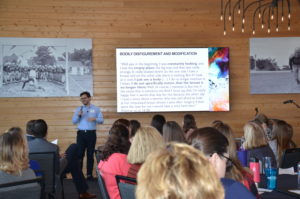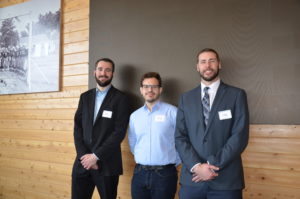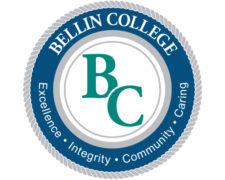Phenomenology looks at the philosophical side of caring
 Bellin College, along with the Bellin Health Foundation, Bellin Health, and The Oxford Research Centre in the Humanities, hosted the sole Phenomenology and Healthcare International Workshop in the United States. Phenomenology is, according to Oxford Dictionary is “an approach that concentrates on the study of consciousness and the objects of direct experience.”
Bellin College, along with the Bellin Health Foundation, Bellin Health, and The Oxford Research Centre in the Humanities, hosted the sole Phenomenology and Healthcare International Workshop in the United States. Phenomenology is, according to Oxford Dictionary is “an approach that concentrates on the study of consciousness and the objects of direct experience.”
The workshop is based on a project on how to use phenomenology in qualitative research in healthcare by the Oxford Research Centre in the Humanities in England. The project leader, Dr. Dan Zahavi, is a Professor of Philosophy at the University of Copenhagen where he directs the Center for Subjectivity Research and is a Senior Research Fellow at the University of Oxford where he is working on this study. He has authored and edited 30 books and over 200 articles and book chapters and is a world-renowned expert in phenomenology. He was not in attendance at the workshop in Green Bay.
Dr. Casey Rentmeester, Director of General Education and Associate Professor of Philosophy for Bellin College and has authored a book on the phenomenology of the environment and 18 articles and book chapters. His most recent work focuses on the phenomenology of healthcare. He was integral in securing Green Bay as a location for one of the workshops as he has known one of the researchers, Dr. Anthony Fernandez, since graduate school. The event was held in the Titletown Ditrict at Ariens Hill and Titletown Tech near Lambeau Field in Ashwaubenon.
 “I think the workshops went as well as it possibly could have,” he said. “The fact that we had over 80 participants, spanning from providers to professors to students and even patients, come to a workshop on phenomenology, a term that many of them likely did not know before attending, is simply, well, phenomenal. I sit on the Best Patient Experience Committee at the Bellin Health System, and everyone was raving about how excellent it went at our meeting the next day.”
“I think the workshops went as well as it possibly could have,” he said. “The fact that we had over 80 participants, spanning from providers to professors to students and even patients, come to a workshop on phenomenology, a term that many of them likely did not know before attending, is simply, well, phenomenal. I sit on the Best Patient Experience Committee at the Bellin Health System, and everyone was raving about how excellent it went at our meeting the next day.”
The presenters of the workshop were Dr. Rentmeester, Dr. Fernandez and Dr. Steven Burgess.
Dr. Fernandez is Assistant Professor of Philosophy at Kent State University and a Postdoctoral Research Fellow at the University of Oxford where he is aiding Dr. Dan Zahavi in his research on phenomenology.
Dr. Burgess is Assistant Professor of Philosophy at Benedictine University. He has several peer-reviewed publications and has presented his research internationally. He regularly teaches courses in phenomenology.
The event began with a presentation by Dr. Rentmeester, Dr. Fernandez and Dr. Burgess before groups were split off to work in small groups for more targeted discussion sessions at Titletown Tech.
“In the breakout session I facilitated, the faculty were initially carrying the conversation, as might be expected, but the students ended up having some very valuable contributions,” Dr. Burgess said. “On the whole, I thought the workshop attendees offered some truly insightful ideas about the way phenomenology can be applied to medicine.”
Dr. Fernandez was impressed by the workshop attendees, most of which were healthcare professionals from all areas of the industry, or community members involved in advising on patient needs and ideas.
“So many people were willing to share candid stories of their experiences as both health care professionals and as patients,” he said. “Their stories really brought the philosophical concepts to life and demonstrated how phenomenology can help us reflect upon aspects of our experience of illness and disability that we’d normally pass over.”
“Most people do not associate the traditional foci of philosophy with healthcare, aside from some questions of ethics; this workshop did not focus on the standard biomedical ethical questions and instead made use of a field-phenomenology that originated in rather abstract thinking,” Burgess said. “The considerations we discussed: body as object vs. body as lived; the ‘space’ of the hospital room; the unwritten norms guiding healthcare practice; etc., were very concrete and are certainly not ‘side issues,’ but instead essential to providing quality healthcare.”
Phenomenology and philosophy in general isn’t without its challenges and healthcare is no exception.
“A major obstacle to philosophical—and, specifically, phenomenological—applications in healthcare is the inaccessibility of philosophical texts,” Dr. Fernandez said. “The workshop breaks new ground in two ways. First, is distils some of the most useful concepts from phenomenology and makes them accessible to people without a philosophical background. Second, the workshop guides attendees through the process of reflecting on their own experiences in light of these philosophical concepts, providing attendees an opportunity to not only better understand their own experience and the experience of their patients, but also to get a clear grasp of the philosophical concepts by putting them into practice.”
“I think one of the biggest things we all showed genuine interest in was how to understand the patient’s perspective in order to provide patient-centered care,” Dr. Rentmeester said. “In philosophy, phenomenologists have been working on understanding the perspectives of others for over a century now, and it is just fantastic that this work is now bleeding into the healthcare setting, since it is so relevant to providing empathetic care to patients.”
After the breakout sessions at Titletown Tech, the groups reconvened for a wrap-up discussion on what was learned and discovered during those breakouts.
“I really enjoyed our reconvening session where we discussed phenomenologically inspired questions and I think many of those well-positioned at Bellin Health and Bellin College could see the potential for some of these in how routine healthcare can be improved,” Dr. Burgess said. “Some simple questions like ‘what do you fear most with this procedure/plan of treatment?’ or ‘what do you hope to get out of your experience?’ can really impact patient experience and more importantly quality of care. Some promising ideas that were floated were to include such questions in Vitals Procedure with every patient; to offer training programs for nurses and doctors to become more aware of their patients as whole persons; to screen prospective employees during interviews for aptitude with phenomenological care.”
By all accounts, the workshop was a success to those involved.
“I think that the workshop showed that dialogue between healthcare professionals and academic philosophers is incredibly productive and enlightening for everyone involved,” Dr. Fernandez said. “Talking through concrete examples with healthcare professionals not only brings philosophical concepts to life. These conversations often challenge philosophical assumptions about the nature of embodiment and illness, pushing philosophers to rethink their own assumptions.”
“I think there is a tremendous amount of room for growth in this field, and this workshop represents just the beginning,” Dr. Burgess said.
One question remains, where does Bellin College go from here with phenomenology?
“For Bellin College, I think it would be great if a full course could be developed on phenomenology of medicine and illness,” Dr. Fernandez said. “While a one-off workshop is a great introduction to the value of phenomenology for healthcare, a full semester of this kind of content and discussions can go a long way toward influencing long-term healthcare practice.”
Dr. Rentmeester said the team will be looking to hold a follow-up to this workshop, possibly in 2021.
“The fact that Bellin College and Bellin Health is working closely with top-notch researchers at the University of Oxford really speaks to our dedication to our vision as a college, which is to be the best health sciences college in the state of Wisconsin, and Bellin Health’s dedication to providing the best possible experience for patients,” Dr. Rentmeester said.
Other locations of workshops were University of Oxford in Oxford, United Kingdom; University of Iceland in Reykjavik, Iceland; Aarhus University in Aarhus, Denmark; and University of Manitoba in Manitoba, Canada.


